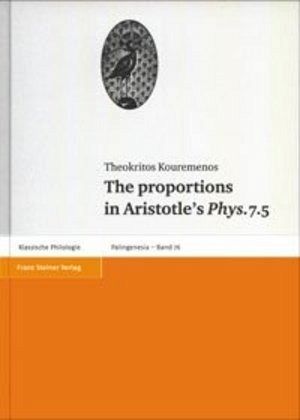Nicht lieferbar

The proportions in Aristotle's Phys. 7.5
Versandkostenfrei!
Nicht lieferbar
In Phys. 8.10 and Cael. 1.7, 3.2 Aristotle establishes theses central to his physical theory by relying on proportions he sets out in Phys. 7.5 without, though, giving any clue as to their character or even their role in the argument he develops in Phys. 7.The author seeks to determine the nature of the problematic Phys. 7.5 proportions, which have been traditionally understood out of any context as Aristotle's flawed mathematical laws of motion, in the light of their applications in Phys. 8.10 and Cael. 1.7, 3.2. He argues that Aristotle conceived these proportions as purely mathematical assu...
In Phys. 8.10 and Cael. 1.7, 3.2 Aristotle establishes theses central to his physical theory by relying on proportions he sets out in Phys. 7.5 without, though, giving any clue as to their character or even their role in the argument he develops in Phys. 7.
The author seeks to determine the nature of the problematic Phys. 7.5 proportions, which have been traditionally understood out of any context as Aristotle's flawed mathematical laws of motion, in the light of their applications in Phys. 8.10 and Cael. 1.7, 3.2. He argues that Aristotle conceived these proportions as purely mathematical assumptions which, though, do not compromise the arguments in Phys. 8.10 and Cael. 1.7, 3.2, for there is strong evidence that for Aristotle these arguments do not turn on any proportionality assumption.
This is the first comprehensive study of the important arguments in which Aristotle makes use of the Phys. 7.5 proportions and sheds light on a rather neglected side of his physics.
The author seeks to determine the nature of the problematic Phys. 7.5 proportions, which have been traditionally understood out of any context as Aristotle's flawed mathematical laws of motion, in the light of their applications in Phys. 8.10 and Cael. 1.7, 3.2. He argues that Aristotle conceived these proportions as purely mathematical assumptions which, though, do not compromise the arguments in Phys. 8.10 and Cael. 1.7, 3.2, for there is strong evidence that for Aristotle these arguments do not turn on any proportionality assumption.
This is the first comprehensive study of the important arguments in which Aristotle makes use of the Phys. 7.5 proportions and sheds light on a rather neglected side of his physics.



